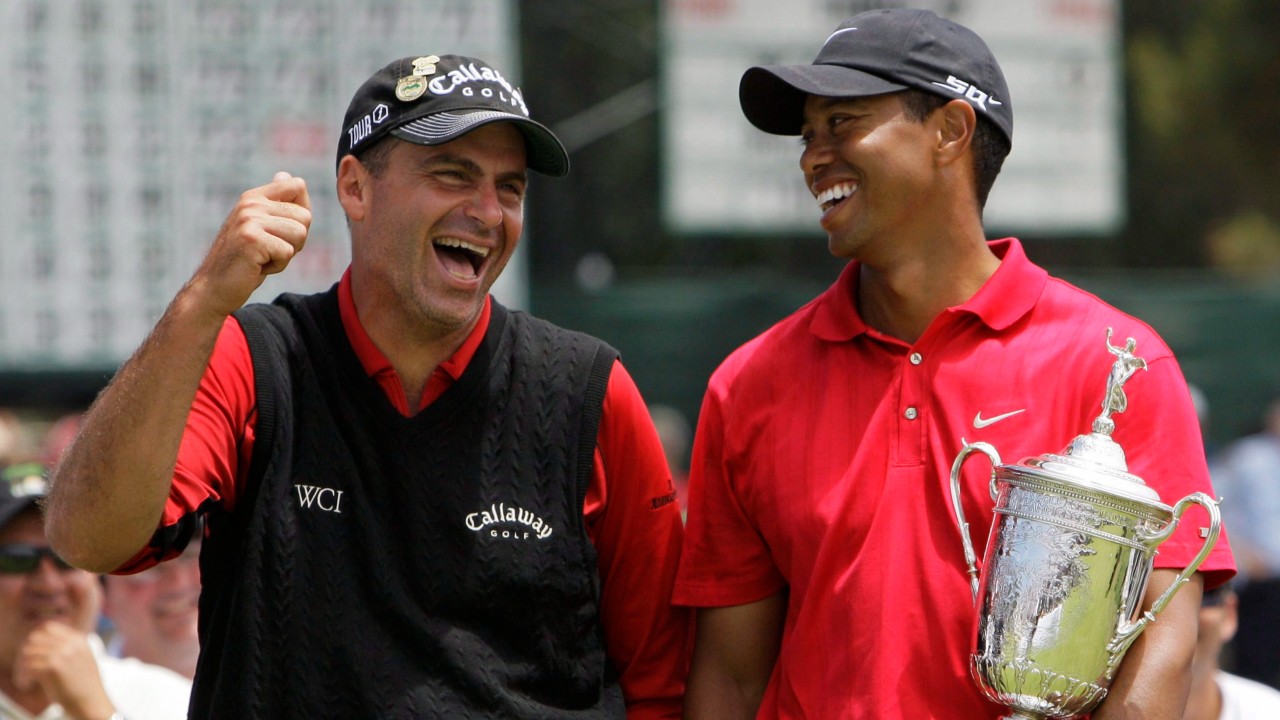
We are in the golden age of sports documentaries and HBO’s Tiger is the latest that should be on your must-see list. The two-part, 190-minute documentary, directed by Matthew Heineman (A Private War) and Matthew Hamachek (Amanda Knox), takes a hard look at the gift and curse of being Tiger Woods, and what impact his upbringing has had on his very public highs and lows.
Over 90 minutes, part one takes you through the rise of a golf phenom and sets you up for his eventual fall. Part two takes a look at his chipping yips, his injuries, his addiction to painkillers and sex, the latter of which knocked him off his pedestal and forced him to rehab his game and image. If you haven’t watched it yet, you can find my takeaways for part one here. Here are my biggest takeaways from the final instalment of the documentary, Tiger part two.
Navy SEALs
Part two begins with Woods’ visits with the U.S. Navy SEALs after the death of his father, Earl, to “honour’’ his dad who was a Green Beret in the Vietnam War. Woods would routinely visit the Mountain Warfare Training Center in La Posta, Calif.
“I remember after this tournament one time, we were driving back to the house we were staying, and he said to me, ‘I think I’m going to give up golf and go into the Navy Seals,’” his caddie, Steve Williams, remembered being told by Tiger.
Woods immersed himself so much he put himself in drills where he’d be target practice.
The SEALs loved to tell stories of just lighting him up. The guys in charge said you can shoot Tiger wherever you want, just don’t shoot him in his hands. They were very well aware, “we don’t want to be the guys that broke Tiger Woods,” ESPN writer Wright Thompson describes.
The brutal training with Navy SEALs took a toll on his body, which was already feeling pain due to his golf career. “Tiger had all sorts of knee and back issues from playing golf. The Navy SEALs stuff was devastating on his body. There was a SEAL who said “injuries are magnets for more injuries, amends Tiger always seemed to get kicked in his left knee,” says Thompson in the film.
The knee
Before the 2008 US Open, Tiger stubbornly kept training after a scope revealed he has no ACL in his knee. He went on to crack two bones in his knee. “There wasn’t anything that was going to stop him. Two fractures in his knee and no ACL, nothing was going to stop him,” recalled Williams.
Williams explains that he tried to plead with him, “Tiger you’re jeopardizing your career, it might be time to quit” as he struggled to play in the opening rounds.
As only Tiger could, Williams says the response he got was, “Stevie, (expletive) you, I’m winning this tournament.”
“Tiger was still hurt, obviously, but it didn’t affect the way he played. He still played intense and really good,” said Rocco Mediate.
Mediate, who lost to Woods in the famous US Open playoff at Torrey Pines, remarks of Woods, “I think he thought he was immortal.”
Vintage Tiger
The vintage footage of Woods in the late 2000s is a treat to watch as you’re seeing him at the peak of his powers. When they showcase the 2007 PGA Championship at Southern Hills, shortly after Earl’s death, Williams says Woods had “this aura of invincibility.” But he was compartmentalizing issues away from the course as Williams recalled, “In reality, at that point in time, being Tiger Woods had taken its toll on Tiger Woods.”
Las Vegas
The film depicts Tiger’s secret life that started in Las Vegas. According to Tiffany Masters, a former VIP host, “We catered to Tiger. We spoiled him, treated him like a prince,” which included introducing Woods to women.
“In that entourage, Tiger was a bit of a geek. It wasn’t like he was like Mac Daddy, Casanova. Those guys didn’t really have to be themselves, their hosts did all the work,” said Masters.
And who was in that entourage? According to Armen Keteyian, Tiger’s two running buddies in Vegas were Michael Jordan and Charles Barkley, and they both enjoyed the good life. “The night clubs, the bottle service. I mean, women are literally throwing themselves at them.”
The affairs
A reoccurring voice throughout part two is Neal Boulton, a former editor at the National Enquirer, which revealed the Woods cheating scandal to the public. “Be careful of the image you create of yourself … because it can all come tumbling down,” Boulton warned.
The first affair detailed in the film was one with Perkins restaurant hostess Mindy Lawton, with whom he is described to have had sex with while married in everywhere from his garage to a church parking lot.
A National Enquirer photographer captured images of them allegedly having sex in a car in a church parking lot, even going as far as collecting a discarded tampon to keep as DNA evidence. In exchange for silence, Tiger would appear on the cover of Men’s Fitness, which was owned by the same parent company, according to Boulton.
The most prominent affair detailed in the film is with Rachel Uchitel, the nightclub owner whose 2009 relationship with Woods ended his marriage and shattered his reputation as a role model. Uchitel is interviewed in the film and describes more than a physical relationship, but an emotional one where around her he would “allow himself to be a kid,” eating cereal and watching cartoons. “He was so scared of not living up to the Tiger that everyone else thinks he is,” Uchitel said.
Uchitel also detailed the events leading up to the infamous Thanksgiving 2009 car crash, where Woods smashed his SUV against a fire hydrant and tree after taking Vicodin and Ambien.
As for why Uchitel agreed to break her silence, “For the last 10 year I have stayed quiet about this story, but, at this point, I have nothing left to lose. My name hasn’t lost the stigma at all. It’s always, Rachel Uchitel, Tiger Woods’ mistress.”
“How am I ever going to be with a mere mortal ever again? Because so many people put him on a pedestal and here he was in my bed,” Uchitel said frankly.
Like many things in the film, all roads lead back to his relationship with his father.
Thompson put the ordeal in perspective, saying “Tiger became what he loathed most about his father, a philanderer.”
The backlash
You forget how intense his scandal was covered until you learn in the film there were more New York Post covers dedicated to it than 9/11.
The doc provided a refresher on the now-forgotten 2010 PR nightmare of his mea-culpa press conference with the blue curtains in the background when Woods apologized for his indiscretions.
Billy Payne, the chairman of Augusta National, held his own presser that was just as hard to watch for differing reasons.
Ahead of 2010 Masters, Woods’ first tournament back after the scandal, Payne publicly eviscerated Woods. “Our hero did not live up to the expectations we saw for our children,’” Payne said.
“It’s not the place of the tournament to chastise a former champion, especially a champion of colour,” reflected former Los Angeles Times writer Thomas Bonk.
Sportscaster Bryant Gumbel echoed that statement saying, “It was a public whipping. And I thought it had racial overtones. Who the hell are you?” Gumble angrily questioned.
“One of the things spoken in Black households often is when something would happen somebody older than you would say, ‘I hope he’s not Black. I hope he’s not Black.’ Because you knew it would give fuel and fodder to those people who wanted to see you as much less than them. It was going to be used against you. All those people who really didn’t like him and were trying to find reasons to bring him down and reasons to say, ‘He wants this, and wants that,’ now they’re going to have their moment,” Gumbel explained of the racial dynamic in Woods’ coverage.
Woods’ ex-wife, Elin Nordegren, does not appear on-camera in the docuseries, but is shown being hounded by paparazzi after the affair and subsequently after their divorce became public. You also feel for Uchitel after you witness the footage of her being followed and berated with insults from paparazzi after the affair comes to light.
The DUI
The most startling footage of the doc is his arrest on May 29, 2017, for driving under the influence of several drugs. The raw police video shows a 41-year-old Woods stumbling, barefoot and in handcuffs, into a Florida police station holding cell where he was booked for a DUI after he was found asleep in his Mercedes. He would later plead guilty to a charge for reckless driving, while pleading not guilty to driving under the influence.
The comeback
The doc ends on a much more positive note as Woods’ road to sobriety, return from a back-fusion surgery and his on-course comeback all lead to his 2019 Masters victory. “I’m just getting started. Dad’s not done yet Woods,” said in an archival interview on what he tells his kids. The parallel shots of Woods hugging his dad as he walked off the 18th hole after his first Masters win and hugging his son Charlie after his most recent win at Augusta National bring the redemption story full circle.




